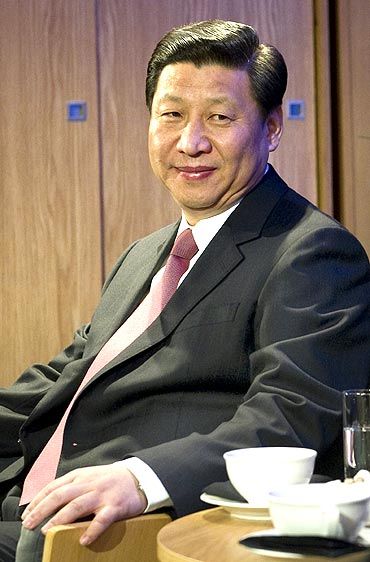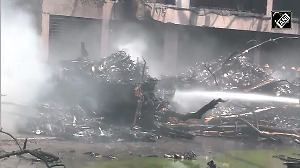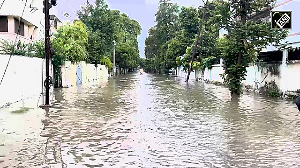 Xi Jinping has accumulated great power but he faces trials that are just as great, says Claude Smadja.
Xi Jinping has accumulated great power but he faces trials that are just as great, says Claude Smadja.
As we start 2014, China’s President Xi Jinping stands head and shoulders above his peers in the world's major countries -- in terms of being in the greatest position of power.
Just one year after his accession to the top leadership position in China, he is now the head of state, general secretary of the Communist Party, and the head of the crucial Central Military Commission. He also leads two newly created important entities: the small top group that will decide on the country's overall reform process and will oversee its implementation, and the national security council that will bring together the heads of the army, police and internal security apparatuses.
His personal charisma; his plain "man of the people" behaviour; his much-publicised fight against corruption, with harsh punishment for some seemingly untouchable senior personalities such as former security chief Zhou Yongkang and Jiang Zemin, who headed the State-Owned Assets Supervision and Administration Commission -- everything has earned Xi a very genuine popularity that none of his predecessors had enjoyed.
However, many Chinese people and observers who were a year ago hailing Xi as a reformer now harbour more of a wait-and-see -- even sceptical -- attitude, which is a result of the significant tightening of control that has happened since then.
The optimistic interpretation of such a tightening is that economic reforms in China are always accompanied by tighter control, since the leadership wants to make sure that things remain within set limits.
The pessimistic interpretation, on the other hand, is that the trend observed in the recent period reflects some kind of "leftist" tendency in Xi, a will to return to some of the tenets and practices of Maoism. Most probably, the truth stands between these two interpretations -- despite his strong power position and his popularity, Xi has to tread a very fine line even as he confronts very contradictory imperatives and constraints.
In a way, the accumulation of power in the hands of Xi is a reaction to a reality underestimated by many foreign observers: the fragmentation of power in China. Since the Deng Xiaoping era, a situation has developed in which, as one of the best observers of China's political scene put it to me, "as the central government will come up with policies, local government will come up with counter-policies". So, Xi has been consolidating power because of this fragmentation and China -- as in fact every country -- needs a strong leader to be able to reform. But this does not necessarily mean that Xi will conduct reforms according to Western expectations.
The Chinese leader knows that he needs to re-balance the economy in order to make it less dependent on investment and exports, less wasteful and destructive for the environment, more knowledge- and innovation-oriented and much more reliant on household consumption. He also knows that he does not have much time and that he needs to achieve a number of transformational reforms over, say, the next five years.
At the same time, his key objective is to perpetuate one-party rule. So, while he recognises the need to give a "decisive" role to the market and to allow the private sector to expand beyond its present limits, the document issued at the end of the Third Plenum of the Communist Party stipulates that the role of State-owned enterprises will remain unchanged -- in other words, the State sector will continue to have a monopoly in key areas of the economy and it will keep on enjoying privileged access to financing and resources.
At the moment, the private sector contributes 60 per cent of China's gross domestic product and 80 per cent of the country's exports but gets only 20 per cent of bank loans. There is no other way to improve the economy than to give a bigger role to the private sector. The question is: at what stage could greater access to financing and resources for the private sector and a more level playing field between private companies and State-owned enterprises begin to shift the balance in a way perceived as dangerous by the leadership because it will upset the overall dominance of the Communist Party and the regime over economic, social and political life?
In the same way, Xi has fully recognised the need to fight against widespread corruption and abuses of power that are generating among people frustration and resentment that could end up threatening political and social stability. But he is never going to accept a system of checks and balances that would create some sort of outside control on the power of the Communist Party.
He is not going to adhere anytime soon to the classic notion of the separation of powers between the executive, legislative and judicial branches of the government. So, what he has in mind is a system whereby the Communist Party will somehow supervise and restrain itself from abuses of power that are too blatant. It remains to be seen if this could ever work.
At the end of the day, it will be wrong -- even dangerously misleading -- to categorise China's strong leader as a "reformist" or a "leftist" or use any other label for him. What China today has is a pragmatist strongman aiming to make his country stronger, richer and more respected abroad, and with a more contented people.
What he decides to reform, such as the hukou system -- the household registration system that binds individuals to their place of origin, thereby limiting their ability to benefit from social advantages when they move without authorisation -- or the one-child policy, or the abolition of labour camps, reflects a pragmatic sense of the improvements needed to achieve greater economic efficiency and reduce sources of popular discontent, without infringing on the power of the Communist Party and the perpetuation of its rule.
Therefore, no "political" reform in the sense the Western world thinks of this concept is -- or will be -- part of the agenda. At the same time, Xi knows that the second generation of urban-dwellers -- the children of the people who moved with or without authorisation from the countryside to the cities 10 to 15 years ago -- will be more demanding in their expectations. They will not easily accept being treated as second-class citizens. Similarly, the young people born in the 1990s with their unique one-child mentality -- greater egotism, the "me generation" -- will also be a social and political headache.
The challenges Xi will be facing in the next nine years of his rule -- if things go by the script of China's political cycle -- are on a par with the power that he has been accumulating. In what he does and what he decides not to do, he might prove to be as crucial to China and to the rest of the world as Deng Xiaoping was 20 years ago.












